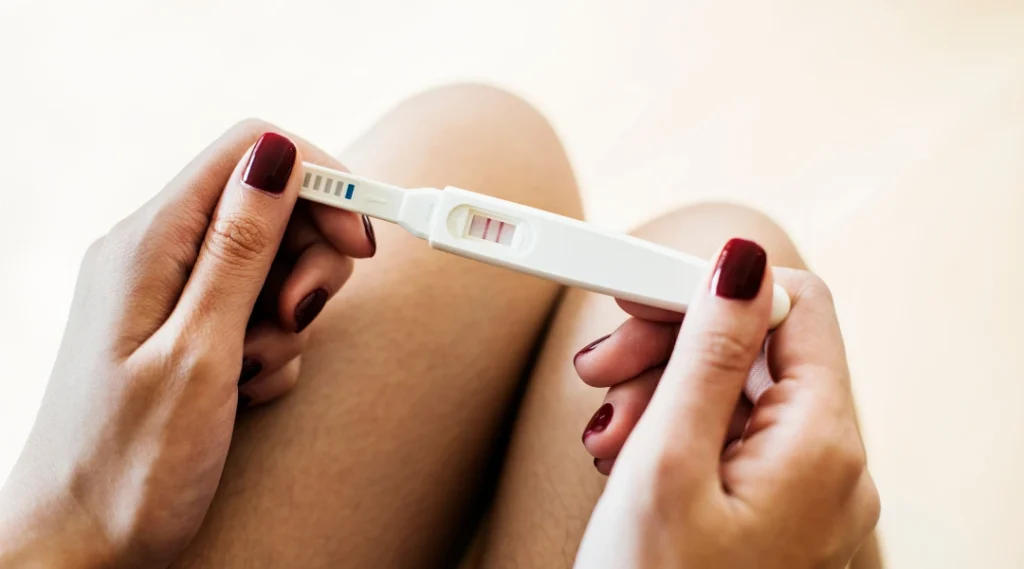
A pregnancy test is a simple, reliable way to find out whether you are pregnant or not. It works by detecting the presence of HCG (human chorionic gonadotropin) — a hormone your body produces only after a fertilized egg attaches to the uterine lining. Because HCG is unique to pregnancy, it’s a trusted biological marker for testing.
How Does a Pregnancy Test Work?
Pregnancy tests check for the HCG hormone, which starts building up in your body about 6 to 10 days after conception. Once levels rise, a test can detect it and give you a positive result.
Two Main Types of Pregnancy Tests
- Urine Test (Home Test)
- Easy to use at home with a test stick or strip.
- Displays results as lines, symbols, or digital words like “Pregnant” or “Not Pregnant.”
- Blood Test (Lab Test)
- Conducted by your doctor or healthcare provider.
- Detects smaller amounts of HCG and gives more accurate or early results.
- Two kinds of blood tests:
- Qualitative HCG Test – Confirms the presence of HCG.
- Quantitative HCG Test – Measures the exact amount of HCG in your blood.
When to Take a Pregnancy Test
The best time to take a pregnancy test is after you’ve missed your period. Some early detection pregnancy tests can detect HCG a few days before your expected period, but results are more accurate if you test first thing in the morning when your urine is most concentrated.
Helpful Tips:
- Avoid drinking too much fluid before testing.
- Check the expiration date on the test kit.
- Always read and follow all instructions carefully.
- If testing early, repeat the test after 48–72 hours for confirmation.
How to Perform a Home Pregnancy Test
Most home pregnancy test kits include detailed instructions. Here are three common methods:
- Midstream Method – Hold the test stick in your urine stream for the recommended time.
- Dip Method – Collect urine in a clean container and dip the test stick in it.
- Drop Method – Use a dropper to add a few drops of urine on the test strip.
After testing, check the control window to make sure the test worked properly before reading the result.
Understanding Pregnancy Test Results
- Positive Result:
You’re likely pregnant. Schedule a visit with your healthcare provider to confirm and begin prenatal care. - Negative Result:
You may not be pregnant, or you may have tested too early. Retest in a few days if your period doesn’t start. - Faint Line:
Even a faint positive line usually means you’re pregnant. Wait 48 hours and test again to confirm.
False negatives are more common than false positives and usually occur when testing too early or not following instructions correctly.
Blood Tests and Pregnancy Confirmation
Blood tests are more sensitive and can detect pregnancy earlier than urine tests. They are often used when:
- You’re undergoing fertility treatments.
- A doctor needs to monitor your HCG hormone levels.
- There’s a suspected pregnancy complication.
Blood tests can help track HCG rise and confirm the progress of early pregnancy.
What to Do After a Positive Pregnancy Test
Finding out you’re pregnant can be exciting and emotional. Here are the next steps:
- Start Prenatal Vitamins: Choose one that includes folic acid and iron.
- Schedule a Doctor’s Appointment: Book your first prenatal checkup as soon as possible.
- Adopt Healthy Habits: Avoid smoking, alcohol, and limit caffeine.
- Track Your Symptoms: Keep a journal of your emotions and physical changes.
- Plan Financially and Emotionally: Start preparing for upcoming changes in your life.
Factors That Affect Pregnancy Test Accuracy
- Testing too early after conception
- Using diluted urine (after drinking excessive fluids)
- Expired or improperly stored test kits
- Certain fertility medications containing HCG
Note: Regular medications, antibiotics, or pain relievers do not affect the test results.
Emotional Aspects of Pregnancy Testing
Waiting for a pregnancy test result can be stressful. Remember:
- Take a deep breath and stay calm.
- Share your results with a trusted friend, partner, or healthcare provider.
- Whatever the outcome, you are not alone — guidance and support are available.
Read More: Japanese Girl Names ,Japanese Boy Names ,Korean Girl Names, Korean Boy Names .
In Conclusion
A pregnancy test is a quick, easy, and reliable way to confirm pregnancy. For the most accurate results, wait until after your missed period, follow the instructions closely, and retest if needed. Whether your result is positive or negative, consult your healthcare provider for personalized guidance and next steps.
Frequently Asked Questions (FAQs)
1. How soon can I take a pregnancy test after sex?
You should wait at least 10–14 days after conception or until your missed period for accurate results.
2. Can I get a false positive result?
It’s rare, but it can happen due to certain fertility treatments or chemical pregnancies.
3. Can stress affect my pregnancy test result?
No, stress does not affect HCG levels or test accuracy.
4. Is morning urine necessary for testing?
Morning urine is more concentrated, which can make early testing more accurate.
5. What should I do if I get mixed results?
If one test says positive and another says negative, wait 48 hours and retest. For confirmation, consult your doctor for a blood test.



0 Comments